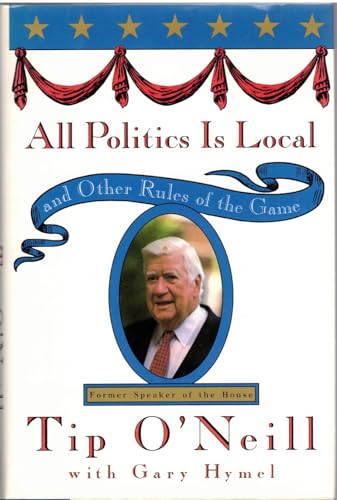Synopsis:
No one knows the inside rules of politics better than Tip O'Neill, former Speaker of the House and a master of his trade. Having spent fifty years in elected office, from the back wards of Cambridge to the back rooms of Congress, O'Neill has learned what it takes to get elected - and what it takes to stay in power. In All Politics Is Local, O'Neill shares his secrets of success.
With colorful humor and street-corner smarts, O'Neill explains the rules of the game in a straightforward and entertaining manner. First, he states a fundamental rule of politics, such as "Your Word Is Everything," "Don't Give Speeches That Are Pure Bunk," and "Today's Adversary May Be Tomorrow's Ally." Then O'Neill tells a story to illustrate why these rules are true. "Storytelling is the easy part," O'Neill writes. "Sometimes I had to think hard what the principle was."
O'Neill has spent a lifetime studying our greatest politicians at work, from Franklin Roosevelt and James Michael Curley to Bill Clinton. He has played poker with Richard Nixon, wheeled and dealed with LBJ, and feuded with Ronald Reagan. In All Politics Is Local, O'Neill reveals what he learned from those experiences and many others.
Along the way, O'Neill provides a lifetime's worth of insight and advice about the political process - the four ingredients to every campaign; why every politician should have a good accountant; how to work the press; why it's so important to use clout; and when to protest.
Tip O'Neill is a national treasure. All Politics Is Local will be enjoyed and studied for generations.
From Kirkus Reviews:
Clich‚d counsel from retired Speaker of the House O'Neill, whose short-take effusions here attest that brevity isn't necessarily the soul of wit--or wisdom. Drawing on experiences gained in an elective career spanning more than half a century (and on the editorial assistance of his former press secretary), O'Neill offers what he characterizes as a primer on politics. Actually, his text encompasses a scattershot collection of bipartisan precepts coupled with putatively illustrative yarns. Grouped under seven main headings (``Campaigning,'' ``Serving Constituents,'' ``Using Clout,'' etc.), the author's, as it were, tips for aspiring officeholders will strike most readers as elementary if not downright obvious. Cases in point include bland reminders that would-be lawmakers should be willing to compromise; know any audience they're addressing; remember their roots; and take care of the voters who elect them. Nor does O'Neill shy from supporting items on his own agenda--e.g., by deprecating term limits and lauding the two- party system. There are also some general-interest advisories here, including guidance on how to lobby congressmen. Far less charming than O'Neill's first (Man of the House, 1987). The wispy anecdotal dicta here will do little to enhance the author's status as either a savvy pol or as an elder statesman worth heeding. -- Copyright ©1993, Kirkus Associates, LP. All rights reserved.
"About this title" may belong to another edition of this title.
![]()
